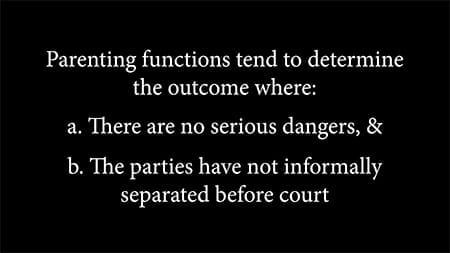by Samuel K. Darling, Everett Divorce Attorney at Genesis Law Firm
How do you win custody in a divorce or family law proceeding in Washington State? Often the key is to position yourself properly and gather trustworthy evidence. This article provides a list of tips from a practicing divorce attorney in Washington State, and it couches those tips within relevant Washington law. When spouses begin breaking up, the first to understand and act upon this information commonly gets the child(ren).
Notably, this information applies equally to nearly all family law custody disputes, though it assumes the parties are divorcing. This information also applies to people already engaged in custody litigation, though there is less time to jockey for position and gather evidence.
Tips

First, do everything you can to document any “191 factors” your spouse exhibits. The term “191 factor” comes from a section number of the Revised Code of Washington (RCW) ending in “191.” The full citation of the code section is RCW 26.09.191. Generally speaking, 191 factors are any dangers, such as abuse and addictions, which bear on the emotional and physical safety of the child in issue. Examples of 191 factors include child abuse, spousal abuse, drug or alcohol addiction, and a parent’s substantial neglect of a child. RCW 26.09.187 makes these 191 factors the foremost consideration when allocating residential time with the child. You can document your spouse’s 191 factors by keeping a daily journal, taking photographs, gathering treatment records, and getting informal statements from witnesses. Do not rely upon your children as witnesses. They generally should not testify or write declarations.
Second, strengthen and document your emotional bond with your child. RCW 26.09.187(3)(a)(i) makes the child-parent bond the most important consideration when 191 factors are not present. Spend significant time doing what you child enjoys. Often documenting this child-parent bond can be difficult, but you should nonetheless try. Keep a journal, take pictures, and otherwise do what you can to show the child has become more closely bonded to you than to your spouse.

Third, take every opportunity to perform and document your performance of parenting functions relating to the everyday needs of your child. Performance of parenting functions tends to be the dispositive consideration in run-of-the-mill divorces where 191 factors are not present, since the court usually determines the child is bonded to both parents. Parenting functions are defined by RCW 26.09.004 as including feeding, clothing, physical care, supervision, education, health care, and providing financial support. Pickup and drop-off your child at daycare, and get daycare records to prove it. Take your child to his or her doctor’s appointments and get to know the physician so she can testify on your behalf. Take your child to his or her school activities, and get to know the teacher. Take your child to his or her extracurricular activities. Enroll your child in activities, and get a copy of the sign-up sheet bearing your signature.

Fourth, strive to gain as much time with your child as possible during any period of separation from your spouse. Especially important is the period of informal separation just prior to the divorce proceedings. If the period of separation is more than a few weeks, courts often fashion custody orders (parenting plans) that maintain the parties’ informal custody arrangements. For periods of longer separation – more than a month or two – this becomes the most important factor the court considers. Jurists believe actions speak louder than words. The court is unlikely to believe a party who left the children in the other parent’s primary care and later claims the other parent should not have custody. This is where divorce attorneys see the most jockeying for position. Clever custody litigants try to take advantage if the parties separate before the court case begins, and they might wait to file for divorce until a few months pass.
Fifth, document your ability to care for your special needs child. Caring for the special needs child is proof of your performance of an essential parenting function under RCW 26.09.187(3), discussed above. Caring for a special needs child can also drastically increase the likelihood of gaining custody of any other children from your marriage. This is because courts try to keep siblings together pursuant to language from the influential case In re Marriage of Little, 26 Wn.App. 814 (1980).
Sixth, if you move out prior to initiating the divorce, chose someplace with low crime, top-notch schools, and good medical facilities. RCW 26.09.002 makes clear your child’s best interests are the paramount concern of the court. If you live someplace safer and otherwise better than your soon-to-be-ex, it would be in your child’s best interest to live with you, right?
Seventh, clean yourself up. Quit smoking. Get your drinking under control. Go to rehab if necessary.
That’s it! Do not worry if you neglected these steps for the past several years. RCW 26.09.194 places special emphasis on the parenting that occurred during the 12 months prior to the divorce proceeding. What you do now – right before you file – matters most. Good luck!
We hope you found this helpful. Our firm believes in making quality legal information available for free on the internet. For more free articles, guides, and videos, please visit our website and click on the resources tab in the upper right corner.
Recommended Articles & Videos:
- Types & Examples of Parenting Plans | Washington State
- Should You Get Divorced?
- Can My Child Testify or Write a Declaration
- Divorce in Washington State: An Overview & Guide *START HERE FOR DIVORCE RESEARCH
- Secret Recordings in Washington Divorces
- How Much Does a Divorce Cost in Washington State?
- Unbundled Legal Services: Representing Yourself with Limited Help from an Attorney
- Property Division in WA Divorces: The Basics
- Spousal Maintenance (Alimony) in Washington State
- Calculating Child Support: The Basics
- What Can’t I Tell My Kids In a Divorce?
- How to Force People to Give Information
- Will My Spouse Have to Pay My Divorce Attorney’s Fees?
- Tips on Keeping Your Divorce Attorney’s Fees Low
- The Difference between Legal Separation & Divorce | WA
- Can’t Afford a Lawyer for My Divorce | WA
Comment below to tell us and other readers about our article(s), how we can improve them, and additional topics you would like our article(s) to address.


You guys have a ton of great knowledge here would you represent a client that lives in Tacoma Pierce County?